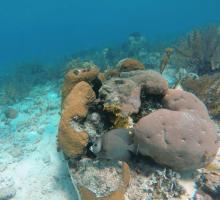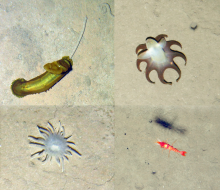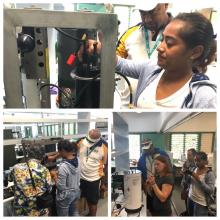Autonomous seawater monitoring equipment
Ocean Acidification is one of the most significant consequences of climate change in marine environments. The impact that this change has on marine ecosystems is less clear, however, as the scale of long-term change in seawater pH is often masked by local fluctuations driven by photosynthesis and respiration on the coral reefs. Consequently, only by establishing long-term monitoring stations and multi-year records can the true nature, and potential impact, of ocean acidification in local/regional settings be established.
Despite being home to many of the world’s most sensitive coral reefs, Small Island Developing States are amongst the most underrepresented in-terms of ocean acidification monitoring capability. The high performance and low maintenance autonomous sensors provided through this project has consequently provided beneficiary nations with the capacity to monitor, understand and manage their marine environment without the need for sophisticated laboratory instrumentation and facilities. Deployment of this in situ monitoring infrastructure in strategic locations identified in partnership with local stakeholders enables these states to monitor the conditions and stresses that their coral reefs are exposed to, supports their commitment to UN’s Sustainable Development Goal 14.3 (to ‘minimize and address the impacts of ocean acidification’), and enables them to contribute to international collaborative efforts to understand regional variations in the extent and impact of ocean acidification, such as the Global Ocean Acidification Observing Network and the Ocean Acidification International Coordination Centre.
Countries supported
Outputs
- Provision of autonomous monitoring equipment and associated training to the Seychelles Fishing Authority.
- Provision of a portable spectrophotometer to the University of Seychelles Blue Economy Research Institute for the analysis of nutrients and other pollutants in freshwater and seawater to help establish and support coastal water quality monitoring.
- Provision of ocean acidification monitoring systems with telemetry and data open-access capability to: (i) the Ministry of Agriculture and Fisheries in Dominica; (ii) the University of the South Pacific in Fiji; (iii) the Coastal Zone Management Authority and Institute in Belize; (iv) the National Fisheries Authority, Papua New Guinea.
- Provision of a nitrate sensor to the University of the South Pacific in Fiji for coastal water pollution monitoring in Fiji and other South Pacific islands. This was supported by water quality assessments visits to Tuvalu and Kiribati (conducted in collaboration with University of the South Pacific and Cefas respectively).
Publications
- Evaluating the sensor-equipped autonomous surface vehicle C-Worker 4 as a tool for identifying coastal ocean acidification and changes in carbonate chemistry. S. Cryer, F. Carvalho, T. Wood, J.A. Strong, P. Brown, S. Loucaides, A. Young, R. Sanders and C. Evans (2020). Journal of Marine Science and Engineering, 8, 939
Workshops
- Advanced scientific techniques to inform integrated coastal zone management (March 2021; Online)
- Ocean acidification and autonomous marine sensor training (October 2017; Fiji)
- Biological oceanography, eutrophication and the formation of algal blooms (October 2016; Seychelles)
The Team
Latest News
Characterising the environmental sensitivity of Belizean coastal waters Oct 2019
 A month long fieldwork campaign has begun in Belizean coastal waters which will enhance understanding of the sensitivities of these fragile environments to the impacts of both human activities and climate change.
Dr Christopher Pearce, programme lead for the NOC, said “Belizean coastal environments are some of the most fragile in the world, and are facing a combination of challenges from both human and climate change factors.
In collaboration with our Belizean colleagues we will be...
A month long fieldwork campaign has begun in Belizean coastal waters which will enhance understanding of the sensitivities of these fragile environments to the impacts of both human activities and climate change.
Dr Christopher Pearce, programme lead for the NOC, said “Belizean coastal environments are some of the most fragile in the world, and are facing a combination of challenges from both human and climate change factors.
In collaboration with our Belizean colleagues we will be... |
High biodiversity discovered in abyssal areas of Kiribati Sep 2019
 A study led by National Oceanography Centre (NOC) scientists, recently published in Frontiers in Marine Science, presents the first ever images of animals living below 4000 metres within the Exclusive Economic Zone (EEZ) of the Republic of Kiribati, a remote island group in the Pacific.
Industry-collected seabed photos revealed a high diversity, but low abundance, of complex animals. The majority of the observed seabed life was single-celled giant forams. This is comparable to similar...
A study led by National Oceanography Centre (NOC) scientists, recently published in Frontiers in Marine Science, presents the first ever images of animals living below 4000 metres within the Exclusive Economic Zone (EEZ) of the Republic of Kiribati, a remote island group in the Pacific.
Industry-collected seabed photos revealed a high diversity, but low abundance, of complex animals. The majority of the observed seabed life was single-celled giant forams. This is comparable to similar... |
Training the Next Generation of Ocean Scientists in Fiji Aug 2017
 The NOC's Dr Socratis Loucaides spent time in Fiji training staff and students at the University of the South Pacific on how to use their new NOC-developed ocean acidification and nutrient monitoring sensors ahead of the sensors' two- month deployment.
The NOC's Dr Socratis Loucaides spent time in Fiji training staff and students at the University of the South Pacific on how to use their new NOC-developed ocean acidification and nutrient monitoring sensors ahead of the sensors' two- month deployment.
|



